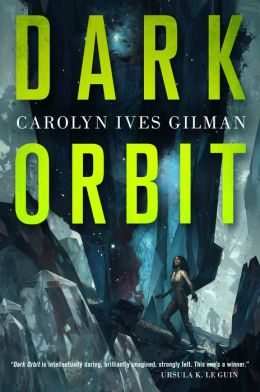I can’t say I’ve ever heard a bad thing about any of Carolyn Ives Gilman’s work. Dark Orbit is the first of her novels that I’ve read, and it certainly lives up to its reputation. And to the promise of its first two lines:
“In the course of Saraswati Callicot’s vagabond career, she had been disassembled and brought back to life so many times, the idea of self-knowledge had become a bit of a joke. The question was, which self should she aspire to know?”
Dark Orbit is a striking work of science fiction, and knowledge—self-knowledge, and how the knowledge of other people can shape a person—is at its heart. It is sharp and glittering and rather more interested in the philosophy of its physics than it is in the science. It’s also a novel about First Contact and the limits of science’s ability to classify data that cannot be seen. And damn, is it one hell of a novel.
Saraswati Callicot—Sara—is an exoethnologist, and an independent spirit. Returning from a long stretch in the field with nothing to show for her work, one of her patrons recruits her to ride herd on a scientific mission to a newly-discovered and utterly peculiar potentially habitable planet. Her real job is to keep an eye on a possibly-unstable crewmate, her patron’s relative. Thora Lassiter was a member of the interplanetary elite, and a diplomat, until her prophetic delusions contributed to a revolt on the planet Orem. Her presence on this scientific mission is intended to keep her out of sight and out of mind, lest she provoke even further unrest. Sara is supposed to make sure she’s safe and not going embarrassingly bonkers.
The scientific mission arrives to find a crystalline planet, laced with dark matter, which provides odd readings for their sensors. When a crewmember dies aboard ship—their head cut off, neither murderer nor murder weapon to be found—the scientists of the mission find their work restricted by the head of the security team. Then, on a trip to the planet, Thora mysteriously disappears.
The scientific mission believed the planet to be uninhabited. But they were wrong. It’s home to a community of the blind, who have a very specific vocabulary for navigating their world, and who rely on perceptions that the sighted cannot grasp. And Thora finds herself among them, in passages under the planet’s surface. As Sara, aboard ship, strives to understand the nature of the planet and to manage the botched First Contact with its peoples—while navigating murky political waters and worrying about the presence of a murderer—Thora, on the planet below, confronts her own past and perceptions in darkness. In order to return to her crewmates, she has to learn to use the same perceptions—quasi-mystical ways of perceiving and knowing—that the planet’s inhabitants have mastered. If she can’t, both the scientific mission and the native inhabitants are likely to perish in the face of a danger that neither, separately, will be able to avoid.
Dark Orbit is told largely from Sara’s point of view, with long sections recounted as excerpts from Thora’s “audio diary.” They’re both fascinating and compelling characters, but the nature of this technique encourages the reader to see Sara’s narrative as reliable, and to consider Thora in the light of an unreliable narrator: we are told from the beginning, after all, that she has in the past been subject to delusions. But as the story progresses the reader comes to see both Sara and Thora as equally reliable—or unreliable—narrators, and is forced in the process to confront assumptions about the validity of different kinds of perception, and different perceptual outcomes. That the scientific mission itself is divided into departments with different theoretical approaches to knowledge, and that the native inhabitants have different approaches and outcomes as regards perceiving and knowing than the scientists of the mission, returns us again to the theme of knowledge.
Dark Orbit is a peculiar novel, by turns sharp and gentle, cynical and idealistic, empiricist and mystical. But its characters are strongly drawn, its universe is richly sketched, and its prose is sheer delight. It is deeply compelling in its peculiarities, and probably one of the best novels of science fiction that I’ve read in the last few years. And it’s fascinating.
Dark Orbit is available July 14th from Tor Books.
Liz Bourke is a cranky person who reads books. Her blog. Her Twitter.










